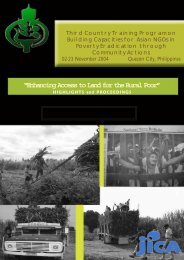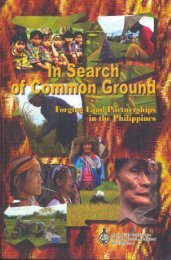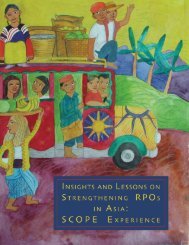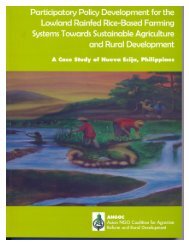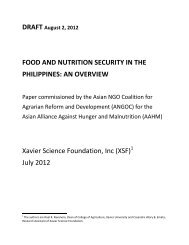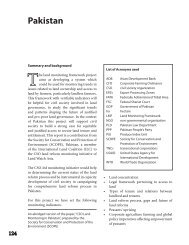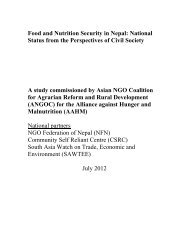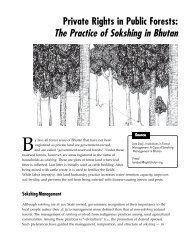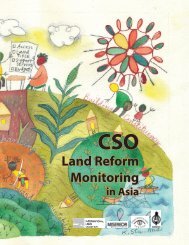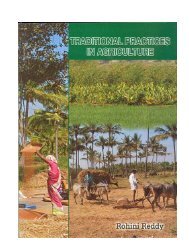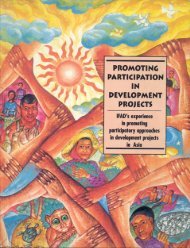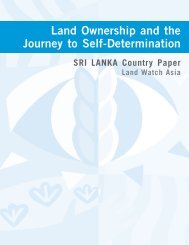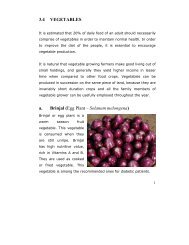Securing the Right to Land FULL - ANGOC
Securing the Right to Land FULL - ANGOC
Securing the Right to Land FULL - ANGOC
You also want an ePaper? Increase the reach of your titles
YUMPU automatically turns print PDFs into web optimized ePapers that Google loves.
SECURING THE RIGHT TO LAND104<br />
Both laws also go against <strong>the</strong> grain of <strong>the</strong> 1960 Basic Agrarian<br />
Law. Despite <strong>the</strong> greater democratic space prevailing in <strong>the</strong><br />
country, <strong>the</strong> conditions of <strong>the</strong> Indonesian peasantry have actually<br />
taken a turn for <strong>the</strong> worse. Therefore, <strong>the</strong> resolution of land<br />
and agrarian conflicts is contingent on <strong>the</strong> revocation of antipeasant<br />
laws.<br />
Developing a Strong and Democratic Peasant<br />
Based Organization<br />
As a key strategy, advocacy <strong>to</strong> promote <strong>the</strong> agenda of agrarian<br />
reform must be undertaken, especially among <strong>the</strong> rural poor<br />
people. Among <strong>the</strong> peasantry, <strong>the</strong> development of a strong and<br />
democratic peasant-based organization is urgently needed. The<br />
movements involving land occupation and land redistribution,<br />
which have taken place in <strong>the</strong> last 10 years in Indonesia, show<br />
that <strong>the</strong> pursuit of genuine land reform is <strong>the</strong> main agenda and<br />
his<strong>to</strong>rical mandate of <strong>the</strong> Indonesian peasant movement.<br />
Toward realizing <strong>the</strong> agrarian reform agenda, at least five main<br />
tasks must be undertaken:<br />
1. Resolution of all land and agrarian conflicts and disputes;<br />
2. Implementation of land reform programs (including <strong>the</strong> unfinished<br />
land reform of <strong>the</strong> 1960s);<br />
3. Rearrangement of rural production and improving productivity<br />
by prioritizing peasants in efforts <strong>to</strong> improve access <strong>to</strong><br />
land;<br />
4. Revocation of anti-people and anti-peasant land laws and<br />
regulations; and<br />
5. Development of a strong and democratic peasant-based organization.<br />
<strong>Land</strong> reform implies a major change in social relations. It is a<br />
policy option that few governments take willingly. The state is<br />
never a consistently rational, unified, and benevolent entity. It<br />
is beholden <strong>to</strong> dominant social forces. Hence, <strong>the</strong> state cannot<br />
be expected <strong>to</strong> adopt policies benefiting a fragmented and unorganized<br />
peasantry at <strong>the</strong> expense of landlords and o<strong>the</strong>r groups<br />
on whom it depends for support. 5<br />
For <strong>the</strong>se reasons, <strong>the</strong> development of a strong and democratic<br />
peasant-based organization is a very important agenda in agrarian<br />
reform implementation as well as <strong>the</strong> most urgent strategic<br />
intervention in Indonesia <strong>to</strong>day. From <strong>the</strong> beginning, peasant<br />
protests and struggles have significantly influenced <strong>the</strong> dynamics<br />
of Indonesian social movements—even if many of <strong>the</strong>m had<br />
started out as a reaction <strong>to</strong> land eviction brought about by <strong>the</strong><br />
expansion of capital in <strong>the</strong> rural areas, in particular, and development<br />
activities, in general.<br />
Peasants and poor farmers are <strong>the</strong> beneficiaries of any agrarian<br />
reform program. In this regard, <strong>the</strong> participation and support of<br />
peasants through <strong>the</strong>ir strong and democratic organizations will<br />
be a decisive fac<strong>to</strong>r in <strong>the</strong> successful implementation of agrarian<br />
reform.<br />
Building a Coalition <strong>to</strong> Support <strong>the</strong> <strong>Land</strong><br />
<strong>Right</strong>s Struggle<br />
In every case where land reforms have succeeded, protests by<br />
organized peasant producers and rural workers have been a crucial<br />
fac<strong>to</strong>r. Peasant activists who organize <strong>the</strong>mselves <strong>to</strong> bring<br />
about reform usually comprise only a small minority of <strong>the</strong> rural<br />
poor, especially in repressive contexts, but <strong>the</strong>y invariably have<br />
<strong>the</strong> support—albeit silent—of a much larger constituency.<br />
Today, however, <strong>the</strong> possibilities of a mobilized and organized<br />
peasantry seizing and maintaining control of large landholdings,<br />
such as what happened in Bolivia, Mexico, and China during<br />
revolutionary upheavals, are now extremely remote in most<br />
countries. Economic and political power is increasingly centralized<br />
under urban-based national and transnational agencies<br />
and corporations. The frequent exhortations by those wielding<br />
centralized power for greater decentralization of state and corporate<br />
governance seldom include a prior democratization of<br />
land tenure and o<strong>the</strong>r social relations in rural localities. Such<br />
decentralization, when it does happen, usually results in even<br />
tighter control by <strong>the</strong> powerful at local levels and in diminished<br />
opportunities for <strong>the</strong> poor <strong>to</strong> get support from potential allies at<br />
<strong>the</strong> national and international levels.<br />
The privatization of land has been governed by <strong>the</strong> law of supply<br />
and demand: land <strong>to</strong> <strong>the</strong> highest bidder, benefitting <strong>the</strong> land<br />
specula<strong>to</strong>rs and big corporations, first, and poor peasants, a far<br />
second, if at all.<br />
These developments have led many observers <strong>to</strong> give up on <strong>the</strong><br />
agrarian reform effort. The rural poor, <strong>the</strong>y conclude, will simply<br />
have <strong>to</strong> wait until alternative employment becomes available by<br />
o<strong>the</strong>r means. At best, <strong>the</strong>y think <strong>the</strong> poor should be provided<br />
with “safety nets” <strong>to</strong> keep <strong>the</strong>m from starving <strong>to</strong> death.<br />
However, <strong>the</strong> opportunities for land reforms are still available.<br />
Globalization has affected both <strong>the</strong> rural and urban poor nega-



